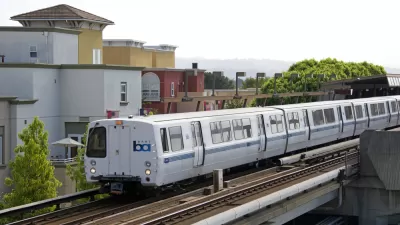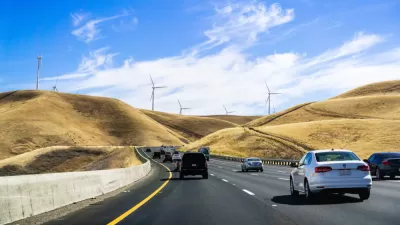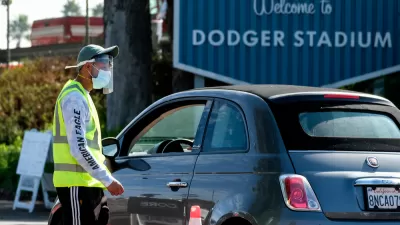Two Bay Area transportation sales tax measures affecting three Bay Area counties performed poorly on Super Tuesday, but it hasn't deterred the groups backing a nine-county mega-measure. Progressive groups are proposing non-sales tax alternatives.

California counties and transportation agencies have historically relied on sales tax measures to fund local and regional transportation projects, be they roads or transit, with mixed outcomes largely due to the two-thirds supermajority vote threshold, a constitutional requirement resulting from several state proposition largely sponsored by anti-tax groups dating back to Proposition 13 in 1978.
Super Tuesday results for two Bay Area transportation sales tax ballot measures could be viewed as ominous for a planned nine-county regional "mega-measure" in November as neither came anywhere close to the 66.67 percent needed to pass:
- Measure I, a 0.25 percent sales tax extension for the Sonoma-Marin Area Rail Transit District in the North Bay, received less than 52 percent of the vote.
- Measure J, a half-cent sales tax for the Contra Costa Transportation Authority in the East Bay, received less than 49 percent of the vote.
Nico Savidge, who covers transportation for The Mercury News and East Bay Times, asks (in the source article) if the two outcomes are "bad news" for the one-cent transportation sales tax measure that is expected to appear on ballots of the region's nine counties in November. The mega-measure, called Faster Bay Area, is projected to raise $100 billion over the next 40 years.
Silicon Valley Leadership Group President and CEO Carl Guardino, who has spent years pushing for the regional transportation measure, said Tuesday’s results weren’t concerning.
“Every election cycle is different,” Guardino said, adding that he is confident higher turnout in November’s general election will boost the campaign.
The other two groups behind the measure are the Bay Area Council, a San Francisco-based regional business group, and SPUR, the San Francisco Bay Area Planning and Urban Research Association.
Progressive groups differ
“Last night told us that people are tired of sales taxes,” said Hayley Currier, with the Oakland-based nonprofit, Transform, that backed Measure J in Contra Costa County, "said the lesson from Tuesday’s election is not that voters are unwilling to raise taxes for transportation — it’s that they no longer want to pay for it with taxes that are disproportionately shouldered by the less wealthy," adds Savidge.
TransForm is part of a pro-transit group called Mobilize The Bay, "which includes local progressive groups, bike advocates and labor organizations."
“It’s time to think about a new way to fund the public transportation we so desperately need. It’s time to ask corporations who profit off of our region to pay their fair share," said Currier.
Rather than a sales tax, the new group "calls for funding transportation projects with an income tax on wealthy earners, 'head tax' for employers, parcel tax on homes and tax on parking spaces that would be the first of its kind in the United States," writes Savidge.
Mobilize the Bay’s parking tax proposal calls for charging between $91 and $365 per space per year for private, off-street, non-residential spaces, such as the lots and garages that surround many of the region’s office parks, grocery stores, restaurants, shopping malls and other establishments. Since that would likely make parking more expensive, Currier said, it would also have the added effect of discouraging people from driving, which could help reduce traffic.
Legislation advances
In order for the Faster Bay Area measure to appear on Bay Area ballots, it must be approved by two-thirds of the state legislature. A "spot bill," SB 278, by the author of the landmark 2017 bill that hiked fuel taxes and motor vehicle registration fees, Sen. Jim Beall (D-San Jose), was approved unanimously the state Senate on Jan. 27.
A spokeswoman for state Sen. Jim Beall, D-San Jose, who has introduced a placeholder bill to authorize the measure, said that while the legislation’s language hasn’t been finalized, “most of the discussions” in Sacramento have centered on the one-cent sales tax, along with measures to offset the impact on low-income families.
What the two sides agree on
“There is definitely a consensus that we need a big, transformative investment in our transit system, because it’s not meeting the needs of the Bay Area,” Currier said. But, she added, “It matters how we fund it.”
Related in Planetizen:
- Super Tuesday Results for Planning and Land Use Votes, March 4, 2020
-
A $100 Billion Wishlist for Bay Area Transit, October 2, 2019
-
Counties Outside of Bay Area Eye Transportation Mega Measure in 2020, September 5, 2019
FULL STORY: Transportation taxes flopped on Super Tuesday. Is that bad news for the Bay Area’s ‘mega-measure’?

Study: Maui’s Plan to Convert Vacation Rentals to Long-Term Housing Could Cause Nearly $1 Billion Economic Loss
The plan would reduce visitor accommodation by 25,% resulting in 1,900 jobs lost.

Alabama: Trump Terminates Settlements for Black Communities Harmed By Raw Sewage
Trump deemed the landmark civil rights agreement “illegal DEI and environmental justice policy.”

Why Should We Subsidize Public Transportation?
Many public transit agencies face financial stress due to rising costs, declining fare revenue, and declining subsidies. Transit advocates must provide a strong business case for increasing public transit funding.

Paris Bike Boom Leads to Steep Drop in Air Pollution
The French city’s air quality has improved dramatically in the past 20 years, coinciding with a growth in cycling.

Why Housing Costs More to Build in California Than in Texas
Hard costs like labor and materials combined with ‘soft’ costs such as permitting make building in the San Francisco Bay Area almost three times as costly as in Texas cities.

San Diego County Sees a Rise in Urban Coyotes
San Diego County experiences a rise in urban coyotes, as sightings become prevalent throughout its urban neighbourhoods and surrounding areas.
Urban Design for Planners 1: Software Tools
This six-course series explores essential urban design concepts using open source software and equips planners with the tools they need to participate fully in the urban design process.
Planning for Universal Design
Learn the tools for implementing Universal Design in planning regulations.
Smith Gee Studio
Alamo Area Metropolitan Planning Organization
City of Santa Clarita
Institute for Housing and Urban Development Studies (IHS)
City of Grandview
Harvard GSD Executive Education
Toledo-Lucas County Plan Commissions
Salt Lake City
NYU Wagner Graduate School of Public Service





























